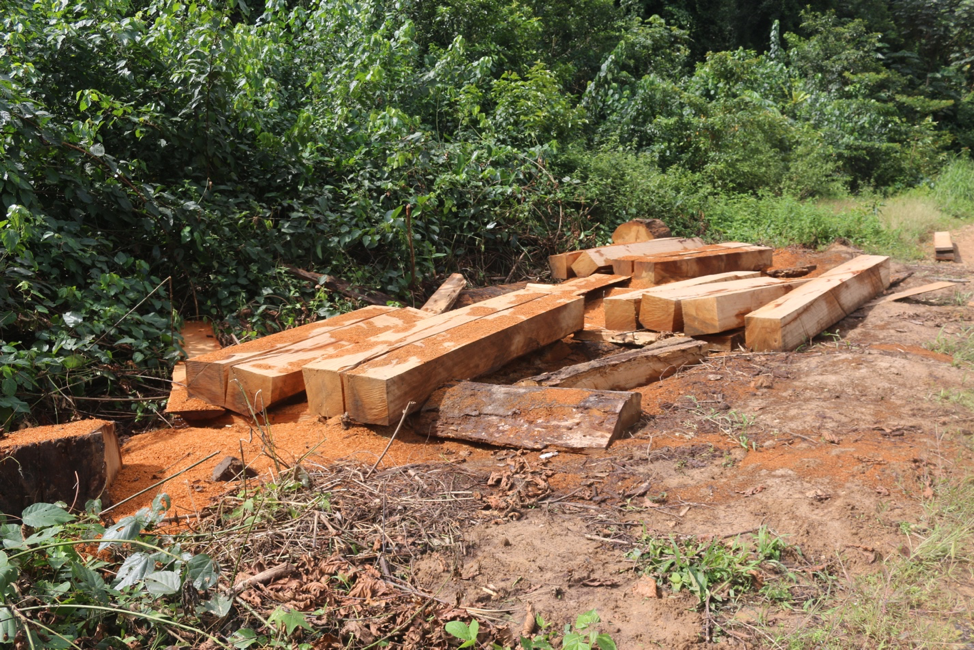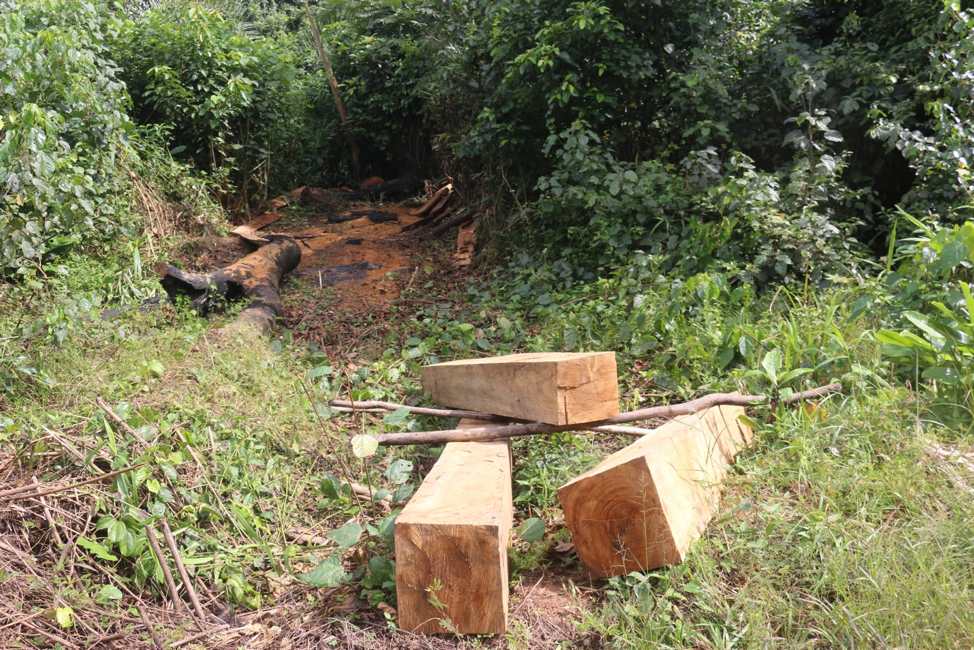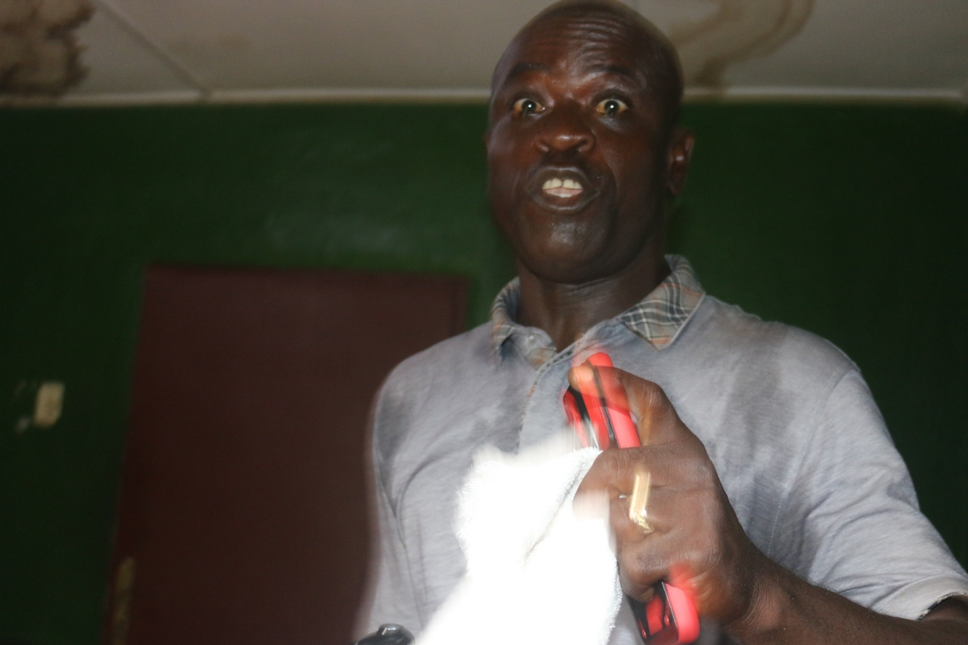Top: Othello Teah, “the regular caller” who has become an illegal logger. The DayLight/James Harding Giahyue
By James Harding Giahyue
COMPOUND NUMBER TWO, Grand Bassa County – A man who calls on nearly all talk shows in Buchanan, Grand Bassa County, is involved in an illegal logging business with at least one villager and the proprietor of the port city’s most famous woodshops, an investigation by The DayLight has found.
Othello Teah, the regular caller, produces timber, commonly called “kpokolo,” a form of illegal logging that is ravaging Liberia’s forests and undermining authorities’ quest to increase logging revenues.
This reporter saw 25 pieces of thick, square woods by the roadside in Boyeah’s Town in Compound Number Two ripped by Teah. Joe Jarvis Boyeah, a villager who he hired, told The DayLight the deal was between Teah and an unnamed farmer.
That information was corroborated by other townspeople we interviewed, including Joshua Gbar.
“The town doesn’t have a share in it,” Gbar said, adding that was the first of such operation in that area.
Teah admitted he runs the operation without a permit and first conducted it in 2019. However, he argued that he did not need FDA’s approval to produce the timber, which he wrongly considered planks.
“Any log that is placed in a dimension is pit-sawing. Two by two is a dimension. Two by five is a dimension. I know,” Teah, revered for his strong stance on issues in Grand Bassa’s radioland, said.

Chanda Cole, Teah’s partner who is the proprietor of the Cole Joe Wood Work Shop in Buchanan—one of the oldest in the city—backs him. He said the timber was dahoma wood, a durable hardwood used in construction and boatbuilding.
“We don’t do permits from the government to buy and sell wood. We get a thing called business registration from [the Ministry] of Commerce,” Cole wrongly claimed. The ministry does not issue business certificates, the Liberia Business Registry does.
But apart from that, the operation of Teah and Cole violates forestry laws and regulations in several ways.
First, there is a difference between timber, which the pair is producing, and planks, which they falsely claim to be making, according to the Regulation on Establishing a Chain of Custody System. It sets the standard for sourcing, transporting, and exporting wood. It defines “timber is a sawn wood or log,” while planks or lumbers are the “products” of pit-sawn or chain-sawn woods.
Second, chainsaw millers are only permitted to produce planks, which are way lighter and smaller than the timber Teah had produced in Boyeah Town.
Third, chain-sawn woods can only be sourced from a concession area, authorized private forestland, and an approved community forest, not from an ordinary farmer.
And, in fact, chainsaw milling is illegal, as there is no current regulation for it after a previous one was dropped years back. It is being permitted to support construction works in Liberia since logging companies do not supply the local market. A regulation for the subsector has been drafted and is being reviewed by the Board of Directors of the FDA.
Inconsistency
Both Teah and Cole contradicted themselves on why they are harvesting the timber in Boyeah Town.
When we initially phoned Teah, he claimed that the woods were meant for the construction of a bridge in Compound Number Three. That was exactly what Joe Jarvis Boyeah told us. Later in an interview, Teah flipped that he was supplying a company. But when quizzed further, he said he was actually supplying Cole’s woodshop. That was the first time in days of discussions that he mentioned he had a business partner other than the farmer and Boyeah.
Cole continued Teah’s inconsistency. Teah had called him to convince this reporter that their business was not illegal. He, too, first claimed that the woods were meant for a company.
“We use it on the bridge, we use it on the machine to balance on it to work,” Cole said in an interview at his workshop. But he somersaulted as the interview progressed, claiming they were meant for his shop. One of the practices in chainsaw milling is that the wood must be sawn into planks in the forest, not elsewhere.
“Don’t change anything here, it’s pit-sawing,” Cole said. “Anything from two-inch up is timber.”
This investigation comes less than two weeks after The DayLight exposed a similar illegal operation in the Compound Number One area, conducted by a woman named Binta Bility. That report came after leaked videos and pictures of Varney Marshall, an FDA ranger showed he ran well-organized kpokolo operations, believed to be in Gbarpolu County.

Zahn Dehydugar contributed to this report.
The story was produced by the Community of Forest and Environmental Journalists (CoFEJ).




